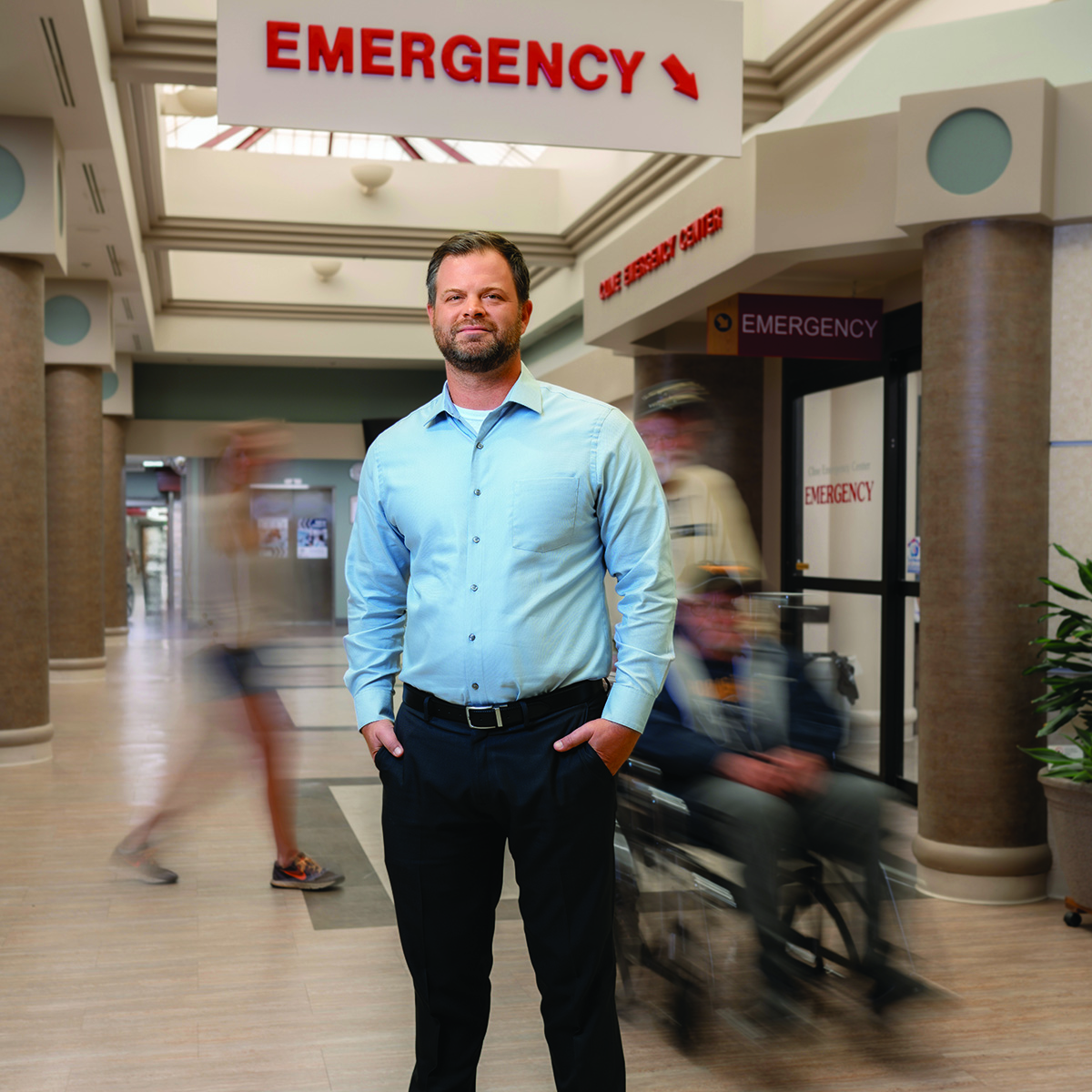Safe and Secure

The Complex Challenges of Hospital Security
When many people think of labor and delivery units in the local hospital, they think of happy places where couples become families and joyful relatives gather to celebrate the next chapter in their family story.
What most people don’t realize is that the typical maternity ward can also be one of the more challenging places for a healthcare professional to work, given the number of child welfare issues that play out here with alarming frequency, even in otherwise tranquil communities such as Mountain Home.
“I was the director of Women & Newborn Care Center for almost nine years, and working in obstetrics, we dealt with a lot of issues,” said Rachel Gilbert, MSN, RN, now Baxter Health’s chief nursing officer. “If a mother was positive for drugs or if we had to hold the baby and DHS had to take the baby, we had to deal with a lot of very angry patients. “I have never physically been assaulted, but I have been verbally screamed at and spit-on. I've had some threats like ‘I’m going to sue you’ or ‘I’m going to find you’.”
Security isn’t the first thing that people think of when they think of what makes a hospital run smoothly, but in this day and age, security has become central to a positive and safe patient experience. Hospitals are open to the public 24/7 and are committed to dealing with whoever walks in, in whatever state or condition they are in. This can create some potentially dangerous scenarios for front-line workers.
“It seems to be happening more on a daily basis. People seem very angry; they want you to do something immediately for them. And as much and as fast as we try to take care of them and make sure all their needs are met, sometimes it’s not fast enough,” Gilbert said. “That seems to be where we’re seeing a lot of the issues, especially with some of the increased assaults in our ER.
“We have had nurses not only verbally assaulted, but they have been physically assaulted as well. We have had nurses who have been attacked and punched. That’s why we’ve been pushing very hard to make sure we do everything we can to keep our team safe.”
Emphasis on security starts at the top, and at Baxter Health, the security department has no stronger ally than CEO Ron Peterson. He said over the 30 years he’s worked in health care, he’s seen security operations become much more sophisticated in training and tactics, something that has only intensified in recent years.
“Since COVID, there’s definitely been a change in the public’s ability to handle stress,” he said. “They’re much more reactive because they’re so fed up with whatever and it just comes out, whether it should or shouldn’t. We have an extremely good security force, but they can’t do it all 100% themselves. So, we’re getting training out to everybody of how to de-escalate situations, making sure people understand and know how to handle those types of situations.”
The security department has been key in this effort, not only in training its own officers, but helping to prepare and coach front-line workers on what to do in certain situations before security personnel can arrive on scene. In this way, medical personnel and security work effectively as a team.
“We have training in the crisis prevention institute where we have some instructors here that teach techniques on how to de-escalate patients,” Gilbert said. “One thing I have really tried to focus on, which I did in OB, is to be more proactive. How we can avoid these circumstances versus just reacting?
“One change we made was to have Security present in the unit anytime DHS was on the floor. Just small changes like that to be more proactive.”
Security planning has also seen more strategic thinking on the placement of officers, knowing that being visible is both reassuring for staff as well as a deterrent for would-be troublemakers. Leadership has also been more cognizant of restricting access to the building, especially after hours and on weekends.
“We hired additional officers to provide better around-the-clock coverage,” said Anthony Reed, Baxter Health’s vice president of ancillary services. “We have implemented new policies; within the last month, we implemented a new nighttime policy at the hospital where the only access to the hospital after hours is through the ER entrance. Potential patients and visitors are all greeted when they come in by a security officer, and that security officer now asks them why they’re at the hospital, signs them in and takes them where they need to go. We lock down the entire hospital at night beyond the ER corridor.
“The elevators also have badge access to get up after hours. A security officer would have to let a visitor up, so it controls that access much more than we had in the past. That’s something very important to the senior leadership team at the hospital, trying to not only protect our patients but protect all of our employees as well.”
Another element of coordination is with outside law enforcement agencies. Baxter Health is in direct contact with local police and sheriff’s offices in the event of a suspect at large who might be seeking medical attention.
“They’re very good at communicating with us, and that communication works both ways,” said Mike Armstrong, director of security. “If we have somebody that has been here that has been a significant issue and then leaves, we contact law enforcement and let them know this person is a danger either to themselves or someone else.”
Perhaps the most significant change in security operations came about 10 years ago when Baxter Health was the first non-university-based hospital in Arkansas to arm its security personnel. Armstrong said he’s never received anything but positive feedback from staff about the move.
“It has been extremely positive,” he said. “Not everyone is pro-gun, and I respect that. To go from not seeing a firearm on an officer’s hip every day to suddenly seeing that, I can understand how that can be a little bracing. But we never received any negative feedback at all. In fact, we received a lot of positive feedback. ’We appreciate you guys and what you do. Thank you for your service.’ That sort of thing.”
“With our security, our enhanced lighting and our enhanced number of video cameras, as an employee I feel very safe and secure coming onto this campus, being on this campus, being around patients, being anywhere throughout the campus,” Peterson said. “Knowing that you have security right there at your fingertips with just one call or being in an area where they’re visible makes the environment much more pleasant to work in and for our patients to be healed in.”



